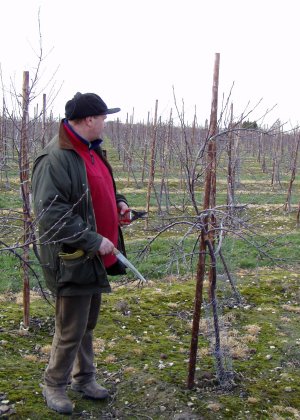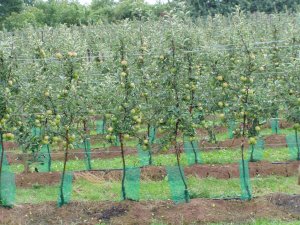

Winter Pruning
After the recent wind most trees are clear of their leaves making the task of winter pruning easier. I would still not rush to prune as trees are still not fully dormant, however for the commercial grower with large acreages to prune, most are under way and many will not finish until spring time. In an ideal world the commercial grower would not start until after Christmas and would be finished and all prunings removed or pulverised by the middle of February. This however is a utopian dream and rarely, if ever happens.
In an ideal world the commercial grower would not start until after Christmas and would be finished and all prunings removed or pulverised by the middle of February. This however is a utopian dream and rarely, if ever happens.
For the the home owner with an apple tree in the garden it is a very different proposition. To begin with what is the purpose of the apple trees? Are they intended to be a fruiting unit providing fruit for the family? Or are they something to enjoy as a source of blossom and scent in early summer, a place to hang the swing and a climbing frame for the children, with the bonus of a few apples straight from the tree in late summer. I was asked many times by visitors to my farm about pruning and I always asked those questions.
If your intention is to maximise the full potential, with plentiful fruit of good quality, it will require discipline and had work. If however it is more of convenience, then enjoy those branches which sweep across the tree in the wrong direction, spoiling the shape, but somehow adding a natural beauty which only freedom from a pruners saw can create. I have spent many a happy hour as a child climbing up into the top of a large Bramley tree, then sitting on a branch that should not have been there, enjoying the view of the surrounding countryside. It was great fun; even better in the company of a young lady!
To create an efficient growing unit tree shape is important as light penetration is the key to crop load and quality. We are in effect 'harvesting' light. It is not just the fruit which needs good light to produce an attractive apple, the fruit bud which will deliver the flowers and our fruit, also needs good light, so the layout of the tree is very important.
 The optimum commercial orchard will be populated with the maximum amount of fruiting wood; e.g. branches and fruit buds, without causing detrimental shading. To achieve this trees will be closely planted in the row to ensure the space between is quickly filled with fruiting wood and the tree height will be controlled to avoid shading the lower fruiting branches. The alleyway between the tree rows neccessary for tractor movement is in ratio to the tree height to stop adjacent rows shading each other.
The optimum commercial orchard will be populated with the maximum amount of fruiting wood; e.g. branches and fruit buds, without causing detrimental shading. To achieve this trees will be closely planted in the row to ensure the space between is quickly filled with fruiting wood and the tree height will be controlled to avoid shading the lower fruiting branches. The alleyway between the tree rows neccessary for tractor movement is in ratio to the tree height to stop adjacent rows shading each other.
Over the next month I will cover all these points in detail and in January prune a well established garden tree in need of some 'remedial' work, demonstrating with photos what and why particular branches should be removed.
Before I end this week's Journal, I must tell you about two events I attended this week. The first was the Autumn members meeting of East Malling Research (EMR) where we members enjoyed a number of scientific presentations from staff at EMR updating us on the progress made in a number of trials ongoing at the research centre. In the afternoon we were entertained, 'yes' that is a very good description, by Dr. Barrie E. Juniper Emeritus Reader at the University of Oxford and Emeritus Fellow of St. Catherines College, Oxford. He is a pioneer in the study of plant surfaces. Barrie delivered The 65th Amos Memorial Lecture; held annually in honour of Jesse Amos who worked at East Malling from its inception in 1913 until his untimely death in 1945.
Barrie's subject was 'The Origin of the Domestic Apple' a truly fascinating subject and one I will return to in the near future in much greater detail as it is worthy of far more space than I have available this week.
My second meeting was The Autumn (again) meeting of The BEST Group. In full, The Brenchley & East Sussex fruit group. At this meeting each year the group bestow an award for outstanding contribution to the fruit industry to an individual of great merit.
The Award is named after an illustrious past member, Raymond Wickham, who was one of the great characters in our industry betwen the two world wars and for many years thereafter. Raymond was a true gentleman and passionate about preserving the best of our industry.
This year the award was presented to David Johnson, recently retired head of Storage Science at EMR. It was poignant that the award should be presented by Dr. Dick Sharples former head of Storage Science at EMR and for 20 years David's mentor. Between them, these to dedicated men have investigated, often starting with a speculative idea, the key factors essential for the successful storage of our Apples and Pears. Discovering the key issues is of course only part of the challenge, it also needs the hours of patient trial work spread over many months to prove a storage regime will stand up to the variables of our seasonal weather. Without them our Apple and Pear industry would be in very poor shape.
![]() A Gripe of mine
A Gripe of mine
A footnote to their fine achievements is the sad demise of research into all fruit science at EMR, directly due to Government Policy.
Dick had in his day a well structured team of scientists with sufficient funds to develop the ideas and carry out the detailed work.
David sadly saw Government Policy withdraw funds on an almost yearly basis. So much so that by his retirement, the team had been reduced to a mere handful. It is testimony to his dedication and patience that he still managed to fulfill his heavy workload, albeit at times with the help of his wife Sue's voluntary helping hands. The frustration at times must have driven him crazy!
EMR is now in the position that there is only one person left to manage any further storage trial work at EMR. This person starts any project with their hands tied behind their back as they have had none of the continuity available to Dick and David as they learnt from their mentors.
It is in my opinion quite scandalous, especially as our Government Ministers are 'pontificating' about the need for The UK to be more self sufficient. With my growers hat on I get very uptight listening to 'prattling politicians' who have reduced our valuable research funds by what has been in annual government budget terms, 'chickenfeed' while passing on much greater sums to umpteen unnecessary quangos!
Well that's all for this week.
Next week I will add more on the subject of pruning and look at new planting going on in Kent
Take care
The English Apple Man